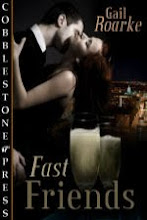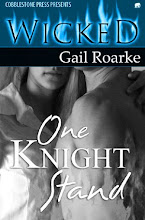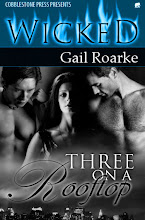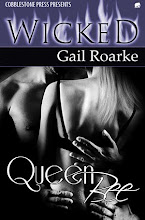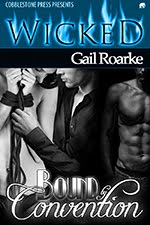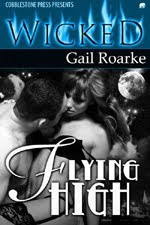 This month I'm excerpting from a work in progress, an as-yet unnamed paranormal romance. Our hero, Duncan, an agent of the vampire community, has tracked down and slain a rogue vampire--and only then discovers that he'd only just sired a child, Claire. His duty is clear....
This month I'm excerpting from a work in progress, an as-yet unnamed paranormal romance. Our hero, Duncan, an agent of the vampire community, has tracked down and slain a rogue vampire--and only then discovers that he'd only just sired a child, Claire. His duty is clear....
His duty was clear. Instead of wasting time washing her feet, he should kill her. A wooden stake through the heart to immobilize her, then remove her head. Once she was dead, he could call Oscar to send a clean-up crew and be done with her.
That's what he ought to do. In fact, he didn't actually need to stake her; it stopped a conscious opponent from struggling, but in her current state, he could simply remove her head and be done with it.
He rose and finished dressing. The last item was the kukri in its leather and wood sheath. It fit inside the waistband of his slacks, behind his back. He reached back to wrap his fingers around the hilt. Draw and strike. One quick, practiced motion was all it required.
He sat and watched her as the bedside clock tracked the minutes and hours of his indecision. She woke once, briefly, at midnight. Her previous foray had nearly exhausted her reserves; she was barely able to move. He watched, his own body immobile. His muscles knotted as he struggled with the desire to feed her again. It was all he could do not to act.
She relaxed into immobility again. The clock continued to display the passing minutes and hours. She struggled up to consciousness again near dawn, weaker still. She gasped for breath she didn't need, driven by lifelong habit. Her fangs descended, as unconscious a reaction as a human's stomach growling when hungry.
Duncan slashed his left wrist and held it over her mouth. He watched himself do it as if in a dream, or a movie. He wasn't conscious of his intent until it was happening.
As before, she sealed her mouth over the wound, sucking at it, throat working as she swallowed the blood. He felt his own hunger begin to stir. This was twice now that he'd fed her; he would have to feed again soon.
She drank more this time. Her hands rose to grasp his forearm, holding it in place as she fed. Her eyes opened, only half-lidded at first. Before she'd finished drinking, he saw the light of awareness fill them. She looked down, eyes almost crossing as she focused on the arm she held to her mouth.
She stopped moving. She stopped sucking. She lowered her head and stared at the bleeding cut on his arm. Her gaze traveled up his arm to his shoulder then to his face. He felt her grip on his arm tighten.
She released him, still staring at the bleeding wound. He sat up straight, pulling his arm away. She watched impassively as he licked his wrist to close the wound. She reached up to wipe her lips, then examined the red smear on her fingertips. She sniffed at them, then licked them clean.
Her gaze shifted, meeting his. "I drank your blood."
"Yes."
She frowned, frustrated. "I drank your blood."
"Yes."
"Does that mean I'm a..." She couldn't face it. "What am I?"
"I think you know."
"A monster." Her answer shook him.
"No, not a monster."
"A vampire?"
"Yes."
"Like the...vampire who attacked me?" Her voice was very small now.
How to answer that question? Yes, like the vampire who attacked her, but not like him. She didn't wait for him to work out a response.
"A monster," she said. Her eyes widened slightly as she looked at him. "Like you."
Her eyes narrowed as her anger rose. "I remember. You gave me orders. Made me do things."
"It was necessary."
Her anger faded as her gaze dropped to his torso. "I shot you. Didn't I?"
"Yes."
Her emotions shifted again. She teared up. "Why would you do this to me?"
"I didn't--" But she wasn't listening.
"I had plans. A boyfriend...." She sounded on the verge of tears.
"I didn't do th--"
"I had life, goddamn you!" She covered her eyes with her hands. "I had a life."
"Listen to me, Claire," Duncan said. He needed to quiet her before she fell into complete hysteria. She was a strong personality, yes, but there were limits--and she was rapidly approaching them. He laid a hand on her wrist. "Claire--"
"No!" She flung herself off the far side of the bed, crouched and ready to fight, or flee. He was between her and the door but he already knew she was a fierce and determined foe. He wouldn't underestimate her again.
He rose from his chair and took a step back to his left, giving her a little more space--and more effectively blocking the doorway. The last thing he needed was another footrace through the neighborhood. She remained crouched, arms raised to fend him off. Her breasts rose and fell as she breathed heavily, still in the grip of lifelong habit.
He tried to meet her eyes but she once again avoided eye contact. "Don't!" Her voice was shrill, and loud enough to wake anyone who might have been in the rest of the house. "Don't try to put the fucking mind whammy on me again!"
He patted the air between them, hoping to calm her a little. "I won't. I promise. I won't try to put the mind whammy on you again, but Claire--you have to listen to me."
She didn't reply, but she didn't refuse either. Progress, he hoped. "I'm naked."
He blinked, confused by this sudden change in topic.
"Why am I naked?"
"The other man--the one who attacked you--must have done it." He might have done more. Probably had, in fact. He didn't mention that to her. No point to it.
She frowned, eyes darting in every direction as she concentrated. "He's--did you tell me he was dead?"
"Yes, I did."
"You're sure?"
"Killed him myself."
"Good." A beat. "Why?"
"Because he'd attacked you, among others. He was a rogue and had to be dispatched."
She'd relaxed her posture a little as they talked. Now she covered herself as best she could with her arms. "I want some clothes."
Duncan nodded. "All right." He backed toward her closet, keeping an eye on her. He spared a glance at it, then resumed watching her. He reached into the side of the closet that held dresses and pulled one hanger out at random, a simple but brightly patterned sun dress. He tossed it onto the bed in front of her. "There."
She leaned over and picked it up. Discarded the hanger and pulled the dress on over her head, gathering the material and popping her head through as fast as possible, apparently fearing he would attack her while she wasn't watching.
The dress slid over her curves and fell into place with only a couple of tugs. It fit her closely and it drew the eye somehow better than her nudity had done. Her lack of a bra was also obvious. Duncan enjoyed the look. He didn't mention it.
"Better?"
She nodded. "Yeah, thanks." The moue of annoyance told him she'd thanked him automatically and didn't like having done so. Ingrained habits were hard to break.
Her posture changed. She wasn't standing so erect now, and her eyes looked sleepy. Just as before, her brief awakening wasn't going to last, especially this close to dawn. She shook her head and forced her eyes open wide. She looked around the room, as if searching for threats.
"It'll be dawn very soon," he told her. He could feel it himself, looming like an execution. Young as she was, she would feel it even more intensely.
"That's what I'm feeling?"
He nodded. "I feel it too."
She looked at the window, where the blinds and curtain were drawn. A faint glow was visible around the edges. She sidestepped away from it, her gaze flicking to him--and then down before he could mind whammy her.
"We'll be safe enough down here," he said.
"I know," she said--and punched him in the jaw with all the considerable power in her body.
She was faster and stronger than she'd been as a human. As was Duncan, but she caught him by surprise--and he weighed no more than he ever had. The blow did minimal damage, but it knocked him across the room. She took the opportunity to flash through the living room with all the speed she could muster, flinging open the door and launching herself out into the pre-dawn gray.
He leaped to his feet filled with a killing fury. Twice now she'd sucker punched him. Twice now, he'd let her get away with it. He'd underestimated her, and it had cost him. Men and women much older and more powerful than she had tried and failed, and paid for their mistakes.
As she would pay. He passed through the doorway and up to ground level in an instant--then stopped, just as quickly. The glowing sky to the east was blinding. He stopped and turned away, blinking away tears. Purple afterimages obscured his vision. The sun would be peeking over the horizon in moments.
It wouldn't kill either of them, but she didn't know that. She was exposing herself to what she believed was certain death. When she'd called her attacker--and by extension, herself--a monster, she had been deadly serious. Despite his anger with her, he had to admire her courage and her decisiveness. With only moments to act, she'd sacrificed her life to avoid becoming a predator like the man who'd turned her.
He turned and stumbled back down into the apartment, half blinded by the bright sky, limbs leaden. Anxiety pounded in his temples, that sense of approaching doom that signaled the arrival of the sun. Slamming the door shut didn't help. He groped his way toward the bedroom. He was nearly there--
* * *
Claire staggered to a halt in the middle of the street against all her instincts. They screamed at her to flee, to find cover. She could feel the sun's imminent appearance pressing down on her. The awful dread was unbearable, as painful as the eastern sky. Tears streaked her face, squeezed out of eyes shut tight against the searing brilliance. It wasn't enough.
She pressed her palms into her eyes, shielding them. She crouched in the street, tensed against the unbearable pain she anticipated. It would be hideously painful, burning to death. How could it not be? She hoped it would at least be quick.
She trembled with terror and grief and fury. She didn't want to die, she was too young. Please god, don't let me die. But if she didn't, she'd become a monster like the one who'd attacked her, who'd bitten her, raped her, forced her to drink his blood. He had done this to her, making her a monster like him. But she wouldn't let him win.
She'd burn first. She'd burn because she was a monster. A thing of legend, something that didn't exist, couldn't exist. Only it did. She did. She'd drunk that man's blood. Her memory of doing so was distant and fragmented, like a memory of a dream. But she remembered how desperately she'd wanted his blood, and how gratifying it was to have it. And even now, god help her, she wanted more. Much more. She couldn't imagine not wanting more.
Only moments now. She steeled herself to remain where she was. Cowardice clawed at her resolve, undermining her determination, throwing rationalizations around, plausible excuses to change her mind. Claire crouched lower, certain she could feel the heat of the sun on her skin, sobbing with the effort to hold herself in place, stoicism abandoned in this last moment of life.
She sensed the sun's arrival. Please, god, make it quick--









